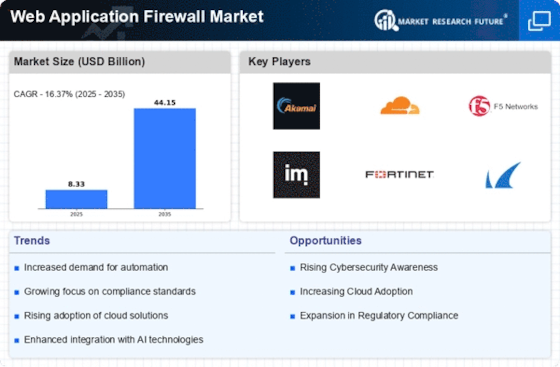Top Industry Leaders in the Web Application Firewall Market

Web Application Firewall Market: Dive into the Latest News and Updates
In the digital age, web applications are the gateways to online businesses, serving as bustling virtual storefronts and portals to critical data. Yet, lurking in the shadows, malicious actors seek to exploit vulnerabilities within these applications, jeopardizing data, reputation, and user trust. This is where the Web Application Firewall (WAF) steps in, a digital sentry standing guard at the gateway, thwarting cyberattacks and safeguarding web applications.
Some of Web Application Firewall Companies Listed Below:
- Akamai Technologies Inc.
- Barracuda Networks Inc.
- Citrix Systems Inc.
- Applicure Technology Ltd.
- Cloudflare Inc.
- F5 Networks Inc.
- Fortinet Inc.
- Imperva Inc.
Strategies Fueling Growth:
-
Cloud-Native WAF Solutions: Offering cloud-based WAF platforms with easy deployment, automatic scaling, and seamless integration with existing cloud infrastructure simplifies security management and caters to the modern web development landscape. -
AI-Powered Threat Detection and Mitigation: Integrating machine learning and AI algorithms into WAF solutions facilitates automated anomaly detection, proactive threat identification, and intelligent attack mitigation, enhancing security agility and response times. -
API Security Integration: Recognizing the growing importance of API-driven applications, WAF vendors are incorporating API security functionalities into their platforms, protecting both traditional web applications and API endpoints. -
Compliance and Data Privacy Focus: Offering features and functionalities that comply with data privacy regulations like GDPR and CCPA builds trust and opens doors to data-sensitive industries.
Market Share Decoding: Key Factors to Consider:
-
Functionality and Feature Set: WAF platforms offering comprehensive security features like positive security models, negative security models, DDoS protection, and bot mitigation cater to diverse web application security needs and complexities. -
Deployment Flexibility: Ability to deploy WAF solutions on-premises, in the cloud, or in hybrid environments ensures flexibility and caters to businesses with existing infrastructure investments. -
Scalability and Performance: WAF platforms must handle large volumes of web traffic, process security events efficiently, and scale with business growth to maintain consistent protection. -
Pricing and Cost-Effectiveness: Competitive pricing models, pay-as-you-go options, and tiered subscription plans make WAF solutions accessible to businesses of all sizes and budgets.
New and Emerging Stars: Illuminating the WAF Path:
-
Serverless WAF Solutions: Startups like Vercel and Fauna develop serverless WAF platforms that simplify security management and integrate seamlessly with modern deployment practices. -
Behavioral Analysis and Intent Recognition: Companies like ThreatMetrix and PerimeterX explore WAF solutions that analyze user behavior and intent, identifying malicious bots and automated attacks with greater accuracy. -
API Security-Focused WAF Platforms: Newcomers like Akami and RapidAPI develop WAF solutions specifically designed for API security, offering granular control and protection for API endpoints.
Latest Company Updates:
October 25, 2023:
-
Imperva Defense Center platform expands with advanced bot detection and mitigation capabilities: This update helps businesses identify and block automated bots that can scrape data, launch denial-of-service attacks, and engage in fraudulent activities. -
Cloudflare launches "Web Application Firewall Pro" with enhanced security features: This new offering provides comprehensive protection against common web vulnerabilities, zero-day attacks, and application-layer DDoS attacks.
November 14, 2023:
-
Focus on API security integration: WAF vendors are increasingly incorporating API security capabilities to protect Application Programming Interfaces (APIs) from unauthorized access and malicious attacks.
December 6, 2023:
-
McAfee announces advanced WAF solution with built-in cloud security: This integrated platform combines WAF protection with cloud workload security to provide comprehensive protection for cloud-based applications. -
Open-source WAF solutions gain traction: Open-source options like ModSecurity and OWASP ModSecurity Core are becoming increasingly popular, offering affordable and customizable WAF solutions for budget-conscious organizations.
January 8, 2024:
-
Emphasis on AI and machine learning (ML) for adaptive security: WAF vendors are utilizing AI and ML algorithms to automatically learn and adapt to new threats, providing real-time protection against emerging attack patterns. -
Rise of managed WAF services: As businesses seek expertise and reduced IT burden, managed WAF services are gaining traction, offering ongoing monitoring, maintenance, and updates for WAF solutions.










